

More-than-Planet
More-than-Planet (MtP) addresses a crisis of planetary imaginary and explores how transdisciplinary cultures can contribute to a new understanding and vision for our environment on a planetary level.
With More-than-Planet, Platform Europe contributes to European cultural-environmental literacy and brings together planetary perspectives and alternative educational approaches. Through a ‘comparative planetary imaginary’, the project empowers European research, innovation, and cultural communities with novel insights, skills, tools, and concrete use-cases. These imaginaries are developed in transdisciplinary, collaborative, art-driven innovation programmes that utilize critical and creative tools to address the environmental state of emergency.
More-than-Planet aims to have long-term impact by developing a pathway toward the framework of European Cultural Outer-Space Activities (ECOSA). It builds on decades of individual efforts by many artists, scientists and cultural organizations who have enabled artistic production focusing on outer space.
The outcomes, among them a commission for a space themed work for the DeepSpace realized by Menche Lab, are disseminated as novel environmental narratives in the context of the Ars Electronica Festival.
More-than-Planet continues the work we started in spaceEU.
#MoreThanPlanet
- Silent Echoes: Dachstein (Installation, Ars Electronica Festival 2024)
- Theme Exhibition: (Co)Owning More-than-Truth (Ars Electronica Festival 2023)
- Ars Electronica Theme Symposium: (Un)Earthing the Truth – Ownership and Narratives about the Planet (Ars Electronica Festival 2023)
- Systemic Change in the Times of Polycrisis (Ars Electronica Festival 2023)
- Planetary Mattering (Ars Electronica Festival 2023)
- Planetary Public Stack (Ars Electronica Festival 2023)
- More-than-Planet Lab (Ars Electronica Festival 2023)
- Expert Tour with Miha Turšič: Mattering (Ars Electronica Festival 2023)
- Expert Tour with Annick Bureaud: Terraforming Earth – Decolonizing Space (Ars Electronica Festival 2023)
Duration: 1 June 2022 – 31 May 2025
Partners (Consortium): Waag Futurelab (coordinator), Ars Electronica, Northern Photographic Centre, ART2M/Makery, Leonardo/Olats, Zavod Projekt Atol

More-than-Planet is co-funded by the Creative Europe Programme of the European Union under grant agreement 101056238. Views and opinions expressed on this page are those of the author(s) only and do not necessarily reflect those of the European Union or the European Education and Culture Executive Agency (EACEA). Neither the European Union nor the European Education and Culture Executive Agency (EACEA) can be held responsible for them.